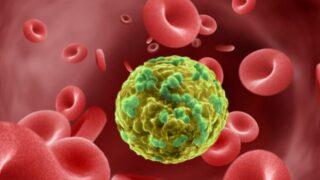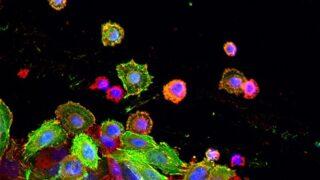Tag: Computer models
Search News
Categories
Archives
OPTIMA: Improving treatment for cancer patients through artificial intelligence
12th October 2021
Professors Claude Chelala and Louise Jones from Barts Cancer Institute, Queen Mary University of London, are part of a €21.3 million public-private research programme that will seek to use artificial intelligence to improve care for patients with prostate, breast and lung cancer.
Read moreBCI researcher receives UKRI Future Leaders Fellowship Award
9th September 2021
Dr Benjamin Werner from Barts Cancer Institute, Queen Mary University of London, is one of the next generation of UK science leaders to receive funding through UK Research and Innovation’s (UKRI) Future Leaders Fellowships scheme. Dr Werner will receive an award of approximately £1.4 million, which will support a research project looking at the evolutionary dynamics of circular extra-chromosomal DNA (ecDNA) in human cancers.
Read moreDissecting complex biological pathways with machine learning
19th July 2021
We spoke with Group Leader Dr Jun Wang and Postdoctoral Researcher Dr Anthony Anene from Barts Cancer Institute’s Centre for Cancer Genomics & Computational Biology about their most recent publication. Published in Patterns, the paper describes the development of a machine-learning tool called ACSNI that can be used to predict tissue-specific pathway components from large biological datasets.
Read moreBCI researcher part of team shortlisted for Cancer Grand Challenges awards
23rd June 2021
Dr Benjamin Werner from Barts Cancer Institute, Queen Mary University of London, is part of an international team that has been selected to share its ideas on how to solve one of cancer’s toughest challenges.
Read moreResearchers use machine learning to rank cancer drugs in order of efficacy
25th March 2021
Researchers from Barts Cancer Institute, Queen Mary University of London, have developed a machine learning algorithm that ranks drugs based on their efficacy in reducing cancer cell growth. The approach may have the potential to advance personalised therapies in the future by allowing oncologists to select the best drugs to treat individual cancer patients.
Read moreImmune ‘cloaking’ in cancer cells
14th September 2020
Researchers have created a mathematical model that can determine the impact of the immune system on tumour evolution. The information gained from using this model may be able to be used to predict whether immunotherapy is likely to be effective for a patient’s cancer, helping to guide treatment decisions.
Read more





